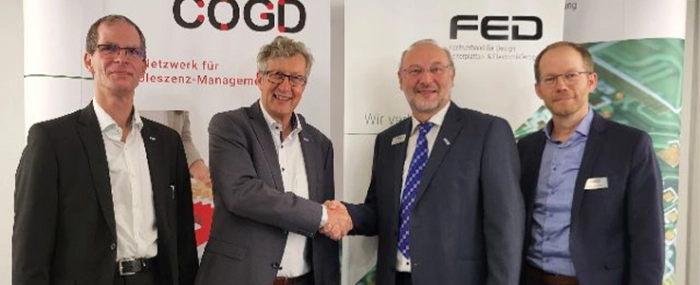
Managing obsolescence: FED and COGD agree on cooperation
The German Electronics Design and Manufacturing Association (FED) and the Component Obsolescence Group Deutschland (COGD) signed a cooperation agreement at Electronica in Munich.
The content of the cooperation is joint activities on the subject of obsolescence of electronic products. This will include coordinated representation of interests vis-à-vis political decision-makers and networking in research and development. In addition, the two associations plan to develop training courses and lectures to demonstrate the benefits of strategic and proactive obsolescence management and to raise awareness of the issue.
"The current situation and also the last two years have shown how dramatically the non-availability of components affects our industry. Without appropriate obsolescence management, this can massively jeopardize companies' ability to deliver. The FED wants to work with the COGD to ensure that the issue of obsolescence is permanently brought to the attention of business and politics, and to demonstrate solutions as to how it can be countered with a long-term strategy", says Dieter Müller, FED Board Chairman, in a press release.
The FED represents the interests of 700 members, including PCB designers and manufacturers, EMS companies, EDA companies, process and technology service providers, and suppliers of manufacturing equipment, software and consumables. The FED provides its members in Germany, Switzerland and Austria with orientation and support in technical business processes and decisions.
"We are very much looking forward to working closely with the FED, because efficient, proactive obsolescence management starts in the design. If risky components or materials are used at this early stage, the subsequent effort required to correct the problem is all the greater", says Dr. Wolfgang Heinbach, honorary chairman of the COGD board.
The obsolescence expert is convinced that, due to geopolitical uncertainties and other imponderables, German companies will have to deal with potential obsolescence risks and their operational and macroeconomic effects much more frequently and to a much greater extent than in the past. This applies not only to the handling of electronic components, but also to an increasing number of raw materials, materials, semi-finished products and software products, he said.
"We have now reached a point where obsolescence can pose a significant risk not only to individual companies but also, in the worst case, to entire sections of our national economy. Making politicians and industry even more aware of this explosive issue is therefore an important common concern for us," Dr. Wolfgang Heinbach adds.


